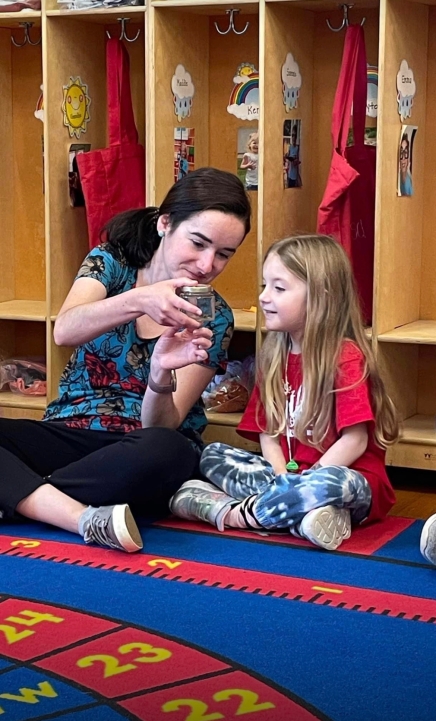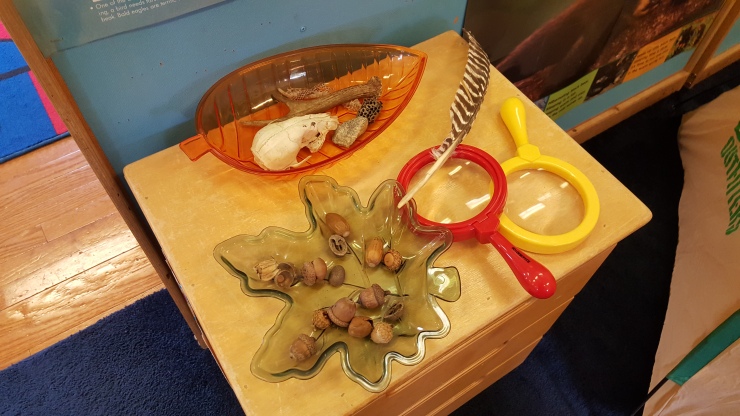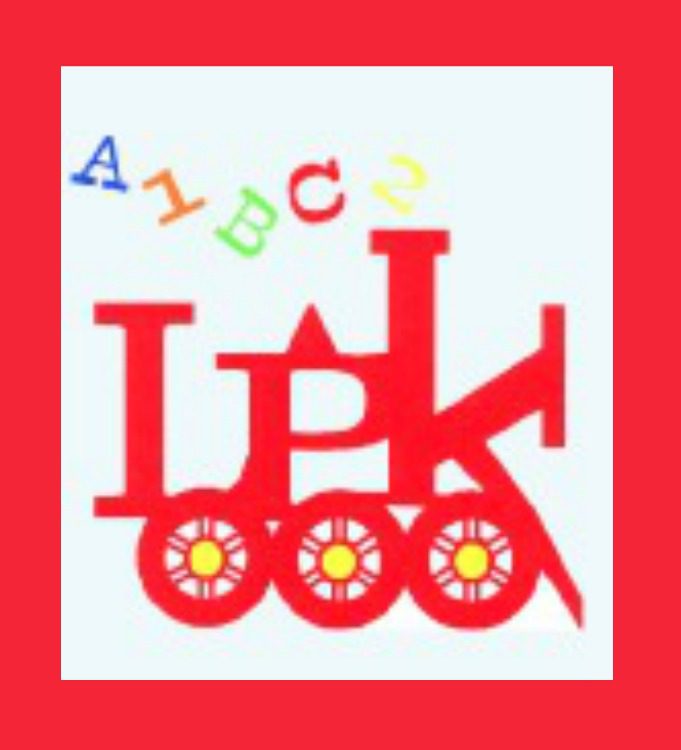The LPK curriculum is informed by the seven “Learning Domains” (curricular areas) defined by the Maryland State Department of Education. These are Social Foundations, Language and Literacy, Science, Social Studies, Mathematics, Physical Well-Being and Motor Development, and The Arts.
LPK employs the ingredients of active learning in all curricular areas. Children are provided with an abundance of materials that they can freely manipulate. They are encouraged to make choices. The teaching staff is supportive, focused on fostering creativity and problem-solving skills. The classroom has well-defined learning centers where children can explore comfortably and independently.
Just as a child’s emotional, social, physical, and cognitive growths are intertwined, so are the subject areas of our class. Thus, many materials and skills are applicable to more than one curricular area.
— Social Foundations —
The Social Foundations learning domain is probably the most important of all the curricular areas. It focuses on each student’s personal and social development. LPK students learn what it means to be a good friend, to be empathetic, and to be helpful. Our class operates by the “Golden Rule” — treat others in a way that you would like to be treated.
We guide our students as they explore ways to play cooperatively, express themselves with their words, and learn to be part of a classroom of peers. We help our LPK friends improve their abilities to compromise, persist with a task, manage their feelings and thoughts, and regulate their behaviors.
— Language and Literacy —
LPK’s 3- and 4-year-old programs offer many opportunities for children to appreciate the written and spoken word. Language and literacy is integral to every learning domain and is present in every aspect of the daily routine.
The entire classroom is print-rich — filled with words and pictures. It is fun and colorful, and one-half of the bulletin boards are child-created. Children are encouraged to speak, draw, and write. They experiment with new words and begin to understand that there is power through speech. Finger-plays, chants, and songs strengthen their language growth with rhymes and patterns.
Children are regularly read to. Classes are introduced to stories that relate to their lives, as well as their fantasies. Interactive storytelling (children use sound effects, hand motions, etc.) helps the children see themselves as a part of the reading experience. They learn to love books, begin to make connections between the written and spoken word, and develop a real enthusiasm for reading.
— Science —
The 3- and 4-year-old programs stress that Science is everywhere. It is viewed as a process of discovery and investigation. Our teachers are responsible for teaching awareness and curiosity; they ask “wondering” and “what if” questions. The children observe, explore, and make connections.
Activities are very much hands-on. Science spins off into math, art, physical education, and just about every area of the classroom. Children have opportunities to examine and manipulate a variety of materials such as seeds, wood, shells, rocks, leaves, nests, feathers, magnets, magnifying glasses, books, and games.

— Social Studies —
LPK views the learning domain of Social Studies as a look at how people on earth live and work together. LPK students are in the early stages of using and understanding socially acceptable behavior and “life skills” – cooperation, taking turns, following simple directions, and settling disputes with words. These concepts play an important role in all areas of study.
Social Studies in our program includes an understanding of our neighborhood, our greater community, our various histories, our values, rules of good citizenship, and how we stay healthy and safe.
— Mathematics —
LPK adheres to the notion that Mathematics is everywhere in the world around us. It involves a child’s entire world. We count the days on the calendar, sort and classify various items by attributes, find shapes in nature, sequence our daily activities, estimate the number of seeds in our pumpkins, graph the results of our apple tasting, measure ourselves with apples and blocks, and so on.
Math is fun and informal. Our classroom provides chances for children to discover and explore processes crucial to mathematical understanding. We plan experiences that introduce children to beginning mathematical concepts: classification, one-to-one correspondence, seriation, numbers, measurement, space, and shape. As with other learning domains, math plays an important part in each area of our classroom.
— Physical Well-Being and Motor Development —
The focus on Physical Well-Being and Motor Development at LPK provides our students with opportunities to exercise and develop their growing bodies. We have a wonderfully-equipped playground with swings, a climbing apparatus, slides, etc. – all tools for enabling large muscle development.
We also have our students participate in activities directed toward perceptual and motor skills. LPK students are encouraged to experience a variety of equipment – balance beam, stilts, parachute, balls, ring toss, bean bags, hula hoops, etc. Children practice hopping like a kangaroo, slithering like a snake, scooting like a crab, etc. These and other imitations of animal movements work a variety of muscle groups and improve coordination. Games and musical activities help the children have fun while refining skills such as hopping, skipping, galloping, and jumping.
Loco-motor skills combine with other curricular areas to add excitement and variety to learning experiences. Students experience books and learning activities that highlight good health habits and practices. Many of these practices — proper hand washing techniques, good nutrition, exercise etc. — are part of our everyday classroom routine.
— The Arts —
The Arts is the learning domain that includes music, theater, dance and the visual arts. The 3- and 4-year-old programs enjoy a variety of music and movement activities each and every Circle Time. Singing, dancing and dramatic play are integral to each class gathering.
Instruments are often used to explore sounds, rhythms and patterns. Picture books set the stage for our 4-year-old students to act out/retell many wonderful stories, complete with costumes and props.
In terms of visual arts, students become acquainted with a variety of artistic mediums. The children explore and identify colors, shapes and lines. Classroom art experiences allow for a variety of hands-on discoveries. LPK consistently encourages the creative spirit of each student.



